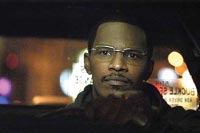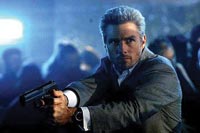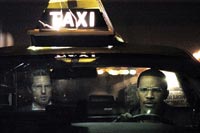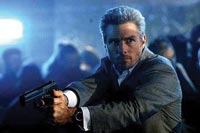 |
Why do big screen killers seem so glamorous? It’s not the filmmaker’s fault, necessarily. We’re flawed and foolish people, drawn to power, to independence, to the illusion that we can be gods unto ourselves and keep our hands, hair, suits, and consciences clean.
The villain in Collateral is as devilish a man as we’ve seen onscreen in a while. He’s almost irresistible, always ready with a rationalization, and quick to turn against you in those moments when you try to break free of his influence. It’s interesting how much he compliments the cleanliness of the taxicab that he hijacks at the beginning of the film. The devil’s not ugly—he likes things clean, shiny, and efficient. That way, nobody tries to look at what’s going on underneath.
About halfway through Collateral, the poor, persecuted cab driver turns and delivers an ultimatum to this gun-wielding hit man who has commandeered his car and his services for the night. He describes his hijacker as a man “missing some parts” that are “supposed to be there.” In that moment, Max (Jamie Foxx), a mild-mannered driver with big dreams, sums up his cold-hearted passenger.

But the words resonate on another level, because they perfectly describe the distinct acting quality of the man playing the killer: Tom Cruise.
Cruise has always looked like a movie star. But most of his roles—from Top Gun to Days of Thunder to A Few Good Men and The Last Samurai—have been similar: driven champions-to-be, momentarily prevented from triumph, bound to overcome some personal obstacle or loss, and then grinning and glorious in the winner’s circle. Cruise’s performances always evidence drive and discipline, but little else. They lack complexity or heart. They’ve got rock-and-roll, but they’ve got no soul. Cruise is a salesman, relentlessly working everything in his power—especially his smile—in order to please you. The façade never comes down to reveal what’s behind it.
Thus, in the superstar’s most interesting roles, that opacity and superficiality has been exploited by the director so the audience recognizes how creepy it is. When he played the heartless, arrogant punk in Rain Man who needed a moral mentor, the shiny shoes fit just right. As a spiritually bankrupt bloodsucker in Interview with the Vampire, he oozed vanity and thirst. In Magnolia, he strutted and preened for the cameras, a boasting paragon of chauvinism, a prodigal son too proud to go home.
Now, in Collateral, Cruise has his best role yet. He’s wearing a designer suit that deserves its own Oscar. It’s cut to a perfect fit, just like his shockingly silver hair. Except for the wolf-grey beard, he looks like he’s made out of stainless steel, and when he runs, you half-expect him to morph into Terminator 2‘s T-1000. His grin gleams with menace. He’s as quick and sharp as a dagger in the back, and yet he seems likely to dissipate into the air at any moment, like a nightmare or a chill. Even the character’s name—Vincent—carries an air of artistry.

Vincent’s in L.A. for one night to kill off five people. To him, they’re nobody special, but to the offshore drug-trafficking cartel that hired him, they’re key witnesses in a case that could bring down their dirty dealings. All Vincent needs is a cooperative driver who will follow orders, either by bribery or by persuasion with a pistol. Max is the unlucky winner. As they hit the streets, the signage printed inside the cab takes on added significance: “Buckle your seat belt.” “Two passengers ride for the price of one.”
Max, it turns out, is more interesting than Vincent. He’s a hard-working driver who knows the ins and outs of L.A. freeways at night, just as his moral compass knows its way around right and wrong. Despite his twelve-year expertise, he insists the job is only temporary. Someday, he promises, he’s going to run a Grade-A limousine service. To keep his dreams alive, he keeps a postcard-photo of a tropical island clipped to his visor. Yet, somehow, those dreams are never tangible enough to get him out of the taxi and into the world of risk and possibility.
Foxx’s performance is a revelation: he is completely convincing, understated, and moves effortlessly through a wide range of emotions and conflicts both comical and severe. If his starring role in the upcoming Ray Charles biopic, Ray, delivers on the promise he shows here, he may earn himself an Academy Award. As he watches Vincent’s acrobatic immorality, Max’s face shifts between wide-eyed awe, horror, angst, and disgust. He feels trapped, and yet each new challenge influences him, altering his character with such subtlety that we hardly notice. He gets frustrated, flabbergasted, humiliated, indignant, and eventually bold, courageous, and cocky; he’s even pushed to the point of taking on a cop with a gun in his hand. By the end of the film, he’s a new man.

But what kind of man has he become? Has Vincent brought out the best in him, or the worst?
The tense interplay between Foxx and Cruise is perfectly pitched and sometimes quite funny. When cops pull over the killer’s cab, Vincent warns Max, “Don’t let me get cornered. You don’t have the trunk space.” When Vincent learns that the hijacking has prevented Max from visiting his mother in the hospital, the film swerves into an inspired tangent of tense comedy that features the formidable Irma P. Hall, who out-performs Cruise just the way she outperformed other Ladykillers earlier this year.
Even when he’s pushing his way through L.A.’s crowded nightlife, Vincent is all business. Other people are just objects to shove out of the way. Still, the story draws a few of these nocturnal phantoms into the killer’s wake.
Mark Ruffalo delivers a stunning turn as an LAPD narcotics cop who picks up the scent—it took me a couple of minutes to recognize him. He takes a poorly scripted, cookie-cutter character and makes him one of the most interesting things in the film. Bruce McGill, who nearly stole the show in The Insider with his explosive courtroom technique, is great here too as an FBI agent laying a net for drug dealers, looking like a compact-model of Donald Sutherland and snarling like a pit bull. Jada Pinkett Smith plays United States Attorney Annie Farrell, Max’s first fare of the night. Smith’s warmth and subtlety reveals her true charms as an actress, talents that went unemployed in her Matrix-sequels roles.

The other great performance in this film is delivered by director Michael Mann. Collateral allows Mann to indulge all of his signature flourishes: slow cruises through the city by night, with the lights gliding across the shiny surfaces of cars, subways, and helicopters; a gun for every well-dressed tough guy; a couple of chaotic shootouts. Viewers will be frequently reminded of his previous films from Ali to The Insider, from Heat to Manhunter. He loves a screen divided by horizontals—freeways, rooftops, horizons, and a windshield that’s cracked in just the right place so Vincent’s visage is fragmented. When Max leaves the cab station, he drives into a panoramic mural of the wild, wild west. Like Heat, Collateral is a tone-poem tribute to the City of Angels—the back alleys, off-ramps, and warehouses we rarely see in films.
Still, Collateral is also Mann’s most formulaic work since he turned in weekly episodes of Miami Vice. Granted, that’s not his fault. Taking a note from Midnight Run, screenwriter Stuart Beattie pairs a wise bad guy and a simple good guy, binds them together, and has the bad guy teaching the good guy to get his life together. In the last act, you can feel the tires suddenly sinking into the ruts of a routine action flick, spoiling the fluidity, spontaneity, and grace of all that has come before. Finally, the film swerves into a tailspin of clichés culminating in a confrontation that plays like a feeble echo of Heat‘s last-act pathos. Coincidences pile up on all sides. People we thought we were meeting by chance early in the film suddenly show up in Vincent’s plans. You have to wonder if Mann will play a slow-jazz version of “It’s a Small World” over the end credits.
These unlikely connections are ironic, considering the film’s faux-philosophical subtext about an overpopulated world that makes each life seem insignificant by comparison. You can feel Beattie’s script straining for importance as Vincent shoots first and then asks questions like “Does anyone notice?” We’re left without any inklings of God or any higher influence. We’re left to assume that it’s a Darwin world out there, and if there’s going to be any love or any care or any meaning, we have to make it for ourselves. The law cannot be trusted. The good man is the one who learns to carry a gun and mete out justice to whatever theme music he chooses.
And yet, the film may strike a chord with American audiences, many of whom feel as if the nation’s been hijacked, and that they’ve been persuaded to carry out the violent agendas of others. If Cruise’s Vincent is good at anything (besides shooting and dressing), it’s rationalizing. He tries to “sell” Max on his job, his mission, minimizing ethical concerns. When one rationalization falls apart (“I shot him. The bullet and the fall killed him”), he tries relativism, comparing the five people he’s killed to mass murders in Rwanda.
The problem is that Mann and Beattie are content to let the Devil win. Whatever Vincent’s fate, it’s hard not to walk away impressed with his slickness and skill. And it’s hard to ignore that, while Max may have learned that life is unpredictable and he needs to “seize the day,” he’s also learned that it’s a whole lot more efficient to carry a gun and work justice as a vigilante than to trust the cops or to bother looking heavenward for help. Collateral tries to be meaningful by tossing in some existential questioning, looking with clinical fascination at the remnants of conscience in its “hero” and “villain.” But it ultimately draws few conclusions about right and wrong, and leaves us with the impression that there is no comfort available to us beyond what we can offer each other. As the music swells during the film’s operatic conclusion, there’s still a bad smell coming from the trunk of this taxi.
Talk About It
Discussion starters- As Vincent takes over, does Max make the right choices along the way? Is he a better man at the end of the film than at the beginning? If so, in what way? If not, is he worse off?
- What do you think made Vincent the man he is? Do you believe any part of the story he tells about his upbringing, or do you think he made it all up? What contributes to the hardening of a heart like Vincent’s? Do you detect any remnants of conscience in his heart?
- What kind of rationalizations do you hear from those around you who misbehave? What rationalizations do you entertain in your own decisions that may not be honest or admirable?
- Why does God allow evil men to get away with murder? What does that tell us about God? What comfort is there for people who suffer loss at the hands of evil men who elude the justice of the law?
The Family Corner
For parents to considerCollateral is rated R for harsh language and graphic point-blank shootings. It’s definitely too intense for younger viewers. Take the rating seriously.
Photos © Copyright Dreamworks SKG
What Other Critics Are Saying
compiled by Jeffrey Overstreetfrom Film Forum, 08/12/04In Collateral, Tom Cruise plays a hit man who hijacks a taxi cab in L.A., forcing the driver to play chauffeur as he makes his murderous rounds. Jamie Foxx plays Max, the conflicted cabbie. The film, directed by macho-man-movie maestro Michael Mann (Manhunter, Heat, The Insider), rivals The Bourne Supremacy for the title of summer’s best thriller.
Collateral allows Mann to indulge all of his signature flourishes: slow cruising through the city by night, with the lights gliding across the shiny surfaces of cars, subways, and helicopters; a gun for every well-dressed tough guy; a couple of chaotic shootouts. Like Heat, Collateral is a tone-poem tribute to the City of Angels—the back alleys, off-ramps, and warehouses we rarely see in films.
But the movie is also Mann’s most formulaic work since he turned in weekly episodes of Miami Vice. Granted, that’s not his fault. Screenwriter Stuart Beattie’s involving script loses momentum in the final act. You can feel the tires suddenly sinking into the ruts of a routine action flick, and a few preposterous coincidences nearly spoil the fluidity, spontaneity, and grace of all that has come before. You can also feel Beattie’s script straining for importance as Vincent shoots first and then asks questions like “Does anyone notice?” We’re left without any inklings of God or any higher influence. We’re left to assume that it’s Darwin’s world out there, and if there’s going to be any love or any care or any meaning, we have to make it for ourselves. My full review is at Christianity Today Movies.
Other religious press critics find themselves with strikingly different responses.
Josh Hurst (Reveal) was impressed: “Music, picture, dialogue, and story all gel together to form an impossibly smooth, spontaneous groove. The first three quarters of the film plays out like an irresistibly improvisational jazz number. I was really rather impressed by the film’s ending; Mann’s ability to take a tired idea and breathe new life into it is indeed masterful.”
David DiCerto (Catholic News Service) says it’s “much more intimate and reflective than Mann’s larger canvas works like Heat. In fact, most of the movie’s two hours involves Max and Vincent driving around talking. Cruise is mesmerizing … [and] Foxx proves a capable counterpoint.”
Annabelle Robertson (Crosswalk) says, “Collateral works, despite a few incongruities. The direction … is excellent, with twists and turns that take us throughout a darkened Los Angeles on a ride through Hell. And, while we can guess the ending, we’re still kept in suspense, carried by Cruise and Foxx’s flawless performances.” But she adds that it “doesn’t challenge, doesn’t provoke, doesn’t inspire. It simply shows us, in chilling cinematic simplicity, a character that is beyond hope or redemption, and how easy it is for that kind of evil to prevail against the forces of good.”
Michael Elliott (Movie Parables) says, “The premise … is admittedly a bit forced, but … Mann and his cast manage to make the film more entertaining than it has a right to be.”
Christopher Lyon (Plugged In) says, “Collateral finds a deeper level than many films about stone-cold killers. Beattie captures the ultimately logical conclusion of a worldview that dismisses God in favor of randomness and chance. Beattie’s script acknowledges Vincent’s evil, but offers only a weak counter to it.” He adds, “Such deeply philosophical questions won’t be enough to convince many families that they’ll be helped by the choice to take in the graphic violence of this dark tale.”
Evan D. Baltz (Christian Spotlight) calls it “a good, exciting mystery that will hold your attention. It does reflect our society’s apparent steady decline towards apathy and indifference for our fellow man and life itself. Be thankful your life is in the hands of a caring and Sovereign Lord, and not left to the fates of cosmic coincidences.”
“Audiences will flock to it (and rightfully so),” says Chris Utley (Hollywood Jesus). “Good performances, crackerjack action scenes and a compelling story make this a fun summer ride. Like Max in this film, our character in times of peril is ultimately judged not by our guilt and shame because we failed to avoid the chaos … but by how we handle ourselves in the midst of the chaos.”
Megan Basham (formerly a critic for Christian Spotlight, now in The National Review) says, “Mann undercuts his powerful analysis of a conscienceless sociopath (and a conscienceless society) with the need to score a political point.” But she’s still impressed with the film: “Considered alongside The Bourne Supremacy, it also suggests that the trend of taking humanity seriously may be growing in the action genre. Kudos to Hollywood if it is. Now if only they would be a little more honest about the source of inhumanity.”
You can scan through the mainstream press reviews here.
from Film Forum, 08/19/04Coffin has much higher praise for Michael Mann’s latest thriller, Collateral: “Though full of implausible plot developments, each scene in Collateral works so well on its own, and is so full of fascinating detail, that one hardly cares. Mr. Mann can make a simple shot of Tom Cruise climbing a staircase full of depth and visual interest. The glimmering city of Los Angeles becomes as much a star of the film as Mr. Cruise or Mr. Foxx. What makes Collateral all the more interesting is the interplay between its stars. Mr. Cruise uses his considerable, but often facile, charm to suck Mr. Foxx—and the audience—into his amoral universe, as he (and, by extension, the audience) becomes increasingly complicit in his passenger’s murders.”
Brett McCracken (Relevant) saw it too and comes out raving: “In a summer movie season of uncharacteristic strength, it shouldn’t surprise many that … Collateral is above average as well. What will come as a pleasant surprise is just how far above it really is. Perhaps seeing is believing, but take my word for it; this film is brilliant.”
But Denny Wayman and Hal Conklin (Cinema in Focus) disagree, offering the film only a “one-star” rating: “Although we rightfully see Vincent as a deformed human being unable to understand moral thought, the underlying theme of the film is disturbingly real. If we become a culture that is not based on any moral foundation, then adultery, lying, stealing and finally murdering will simply be an option seen as normal behavior. Without a spiritual and moral foundation, Vincent’s logic will no longer seem twisted because we will have lost any basis by which to measure it.”
Copyright © 2004 Christianity Today. Click for reprint information.












